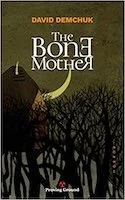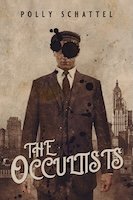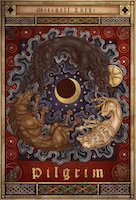5 stars. I'll be honest: I hate it when female characters get pregnant. This bothered me before I really even had words to explain it - way before the internet discovered the word "trope." I thought it was boring, silly, and cheap. A lot of dramatic things can happen to a woman that don't involve pregnancy - why do we return to it over and over again?
Sure, it is absolutely a dramatic thing to happen IRL. Yes, mothers absolutely deserve representation. But I can tell when pregnancy is used as a lazy plot point, like for the sake of a cliffhanger, instead of a genuine factor in a character's development. I can tell. And it drives me crazy.
Imagine how emotional it felt, then, to read this book, in which pregnancy is a major theme, and is in fact written about intentionally, powerfully, and graphically - and woven into horror, my favorite genre, by Grady Hendrix, one of my favorite authors - and how emotional it felt to feel engaged and not put off, to really lean into the narrative because it involved pregnant witches, female empowerment, and revenge...
Fifteen-year-old Neva, pregnant and due in August, is sent to the Wellwood Home in Florida: a secluded refuge for so-called wayward girls. There, stripped of her name and given a new, anonymous identity, she’s told it’s for her own good: she will deliver her baby, surrender it for adoption, and return to her old life as if nothing happened. But isolation breeds rebellion. When the girls are given a book of witchcraft, they begin to test its power. As their bodies and spirits transform, they start to redefine what it means to be “wayward.”
Grady Hendrix gets better with every book, I swear. His writing is so tight now, so full of heart - he's always been amazing at writing hopelessness, which makes it that much more amazing when the tables turn. His signature immersive slang is on full display here, as is his research into the time, place, and spaces in which the story takes place.
I agree with others that the supernatural aspects of the plot didn't perhaps pack as big of a punch as they could have. I would also argue that they didn't need to, because the reality in which he drops us is horrific enough. The fact that he could take a situation so disturbing, so dark, so depressing, so backwards, so infuriating, so disheartening and make it even the slightest bit amusing and warm and hopeful is really incredible.
And I don't think he does it for shock value, as shocking as some of these details read on the page. I don't think he does it so we sit there in awe asking "how could we have been so ignorant as a society and enforce this ridiculous ignorance on others?" Because that is a question that has never gone away, and likely never will. Trust me, I ask it daily, about things that happen... daily. He carves another entryway into this particular issue and it is truly through the hearts and souls of these women. I felt their female resilience, and resistance, in my bones.
Captivating, gut-wrenching, and powerful. Required reading.
Witchcraft for Wayward Girls on: Amazon | Bookshop.org | Goodreads










